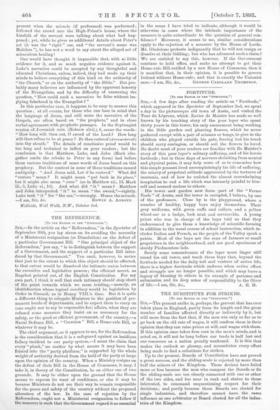THE SUBSTITUTE FOR STRIKES.
[To THE EDITOR. OF THE ""SPECTATOR.""1 Sxn,—The present strike is, perhaps, the gravest that has ever taken place in England, partly from its length and the great number of families affected directly or indirectly by it, but still more from the fact that, if the men win only so far as to go back on the old rate of wages, it will confirm them in their opinion that they can raise prices at will, and wages with them. If this opinion once takes firm root in the men's minds, and is acted on, it will not be long before our trade is half lost an& our resources as a nation greatly weakened. It is this that makes the outlook so gloomy, and necessitates every effort being made to find a substitute for strikes.
Up to the present, Boards of Conciliation have not proved a great success, and the sliding-scale is rejected by more than half the miners of the Kingdom. These devices have failed more or less because the men who compose the Boards or fix the sliding-scale are too closely connected with one or other of the two sides, and too near in rank and status to those• interested, to command unquestioning respect for their decisions ; and partly because these Boards are elected. for single industries, and therefore cannot have the same influence as one arbitrator or Board elected for all the Indus- tries of the Kingdom. I would suggest that some one man should be appointed as general arbitrator, that he should not be a Member of Parlia- ment, or at all events, of the House of Commons, because party feeling is so strong there, that if it did not bias his judgment, it would certainly lay him open to that charge ; but that he should be a distinguished man, such as an ex-Viceroy of India or Canada, or one of our Judges,—a man, that is, who has won a great reputation, and has been accustomed to weigh evidence and settle disputes. Further, that in any difference about wages, three men should be chosen by the employers and three by the men in the particular industry, to give evidence before the arbitrator, and to supply him with all the information he might need. It might be well, too, that two delegates, one of the employers and one of the workmen, of any trades dependent on that in which the dispute arose, should attend to show how the decision would be likely to affect their own.
It seems to me that the decision of such an arbitrator would be respected ; his personal influence would count for much, and his impartiality would be above suspicion, because his own interests would not be involved, while both sides would know that their case had been stated thoroughly. Whether a salary should be attached to the office, is a further question ; tut if one were, as I think would be the right course, it 'should be a large one, say £5,000 or £10,000 a year, to increase the chance of getting an able man of high reputa- tion ; and it should be paid by an equal contribution from employers and employed, so that each side might have, as it were, a personal interest in the man, and feel that its wishes 'had an equal right to his careful consideration. If this is not too crude a suggestion, perhaps you would kindly give it a ,place in your columns as a text to evoke the views of others.







































 Previous page
Previous page